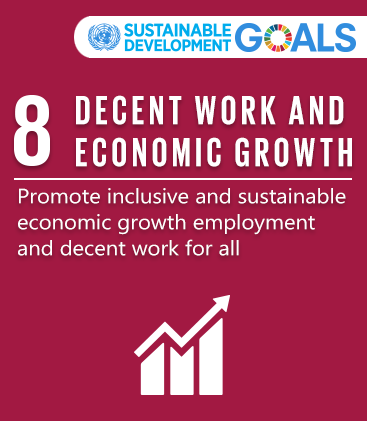The Importance of SDG 8 for Women

Aditi Murti is a marketing major with a strong interest in books, feminist theory and good music. She divides her time between college and various writing projects in Pune.
The Importance of SDG 8 for Women
The Sustainable Development Goals (SDGs) aim to encourage sustained economic growth by achieving higher levels of productivity by implementing technological innovation. This is achieved by creating policies that encourage employment and entrepreneurship plus effective measures to eradicate human trafficking and other forms of slavery/forced labour. With these targets in mind, the goal is to achieve full and productive employment and decent work for all women and men by 2030. Sustainable Development Goal 8 focuses mainly on promoting sustained, inclusive and sustainable economic growth, full and productive employment and decent work for all.
The targets of SDG-8 are inclusive and cover a vast number of areas ranging from promoting development oriented policies to protecting labour rights and promoting safe and secure working environments for all workers. Some of the targets which highlight the need for the marginalised and women’s economic development and growth are:
- Promote development-oriented policies that support productive activities, decent job creation, entrepreneurship, creativity and innovation, and encourage the formalization and growth of micro-, small- and medium-sized enterprises, including through access to financial services
- By 2030, achieve full and productive employment and decent work for all women and men, including for young people and persons with disabilities, and equal pay for work of equal value
- Take immediate and effective measures to eradicate forced labour, end modern slavery and human trafficking and secure the prohibition and elimination of the worst forms of child labour, including recruitment and use of child soldiers, and by 2025 end child labour in all its forms
- Protect labour rights and promote safe and secure working environments for all workers, including migrant workers, in particular women migrants, and those in precarious employment
Decent work, with respect to women, can be any source of employment that does not present any inherent danger or discomfort to women. It means a living wage, workplace safety & policies that prevent and/or swiftly take action against any form of discrimination. SDG8’s focus on decent work is particularly important as it will protect women – especially impoverished and vulnerable women from exploitation and give them a positive work environment that allows them to support themselves with dignity.
A Mckinsey report says that Indian women perform 9.8 times more unpaid work as compared to Indian men. If the number of paid female workers were to increase till the exact same amount as paid male workers – the country’s GDP would increase by 27%. However, according to TalentNomics data – 48% of women drop out of the workforce before they reach middle management positions. Reasons that can be alluded to this are mostly marriage and motherhood related. In fact, childcare facilities are the biggest push to get women into the workforce.
Lack of financial security can be particularly alarming for women from the low income strata of society. No steady income and savings can spell disaster with respect to their health, childcare and family expenses. Lack of steady employment makes getting hired a lot more difficult. If organizations remain hostile to women with respect to flexible timings and support for women to carry out familial obligations, we will have to deal with an enormous number of financially weak and vulnerable women susceptible to dangers such as loan sharks.
In terms of contribution to the economy, women put it enormous amounts of work – especially in agricultural fields. Rural women work in the fields and then cook, clean and do other household chores for zero pay. Indian women are the engines of the economy but their contribution is not recognized enough. This is bound to change while implementing SDG8.
Women are good at getting work done; building coalitions and finding solutions that are long lasting. Children of working women are better fed and better educated thanks to double family income, thus building social capital for the economy. Thus, we must ensure decent work environments to include more women into the workforce and motivate them to willingly stay employed so that they can ensure a respectable lifestyle for themselves and their families.


